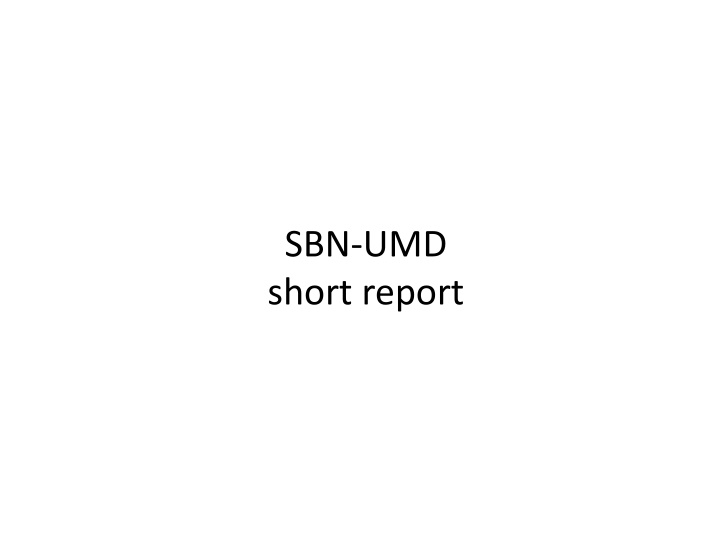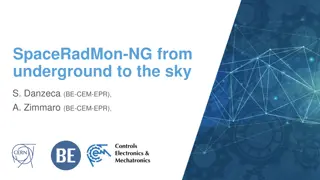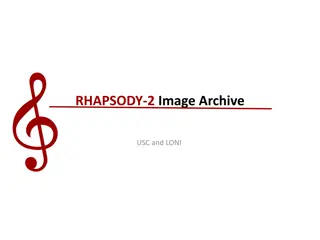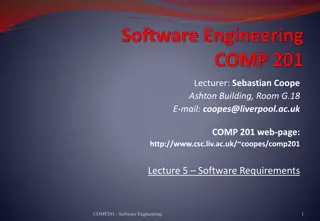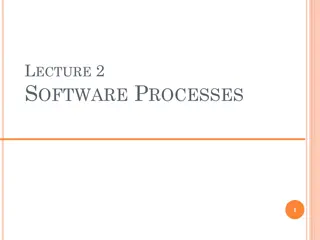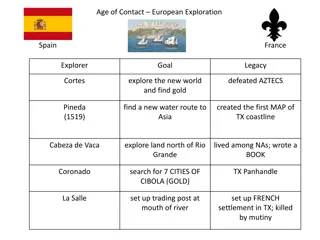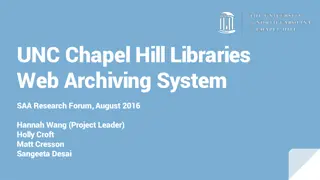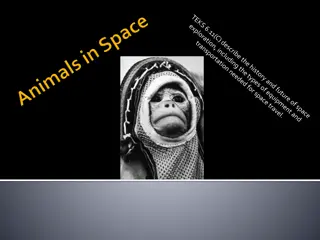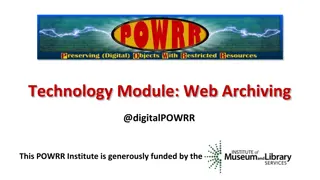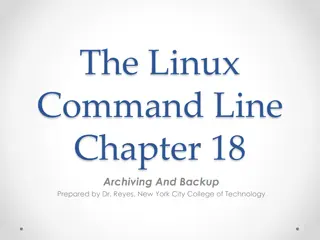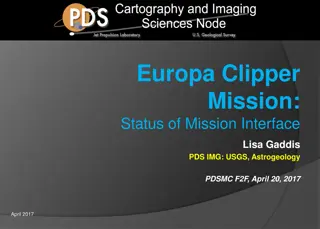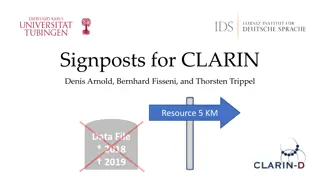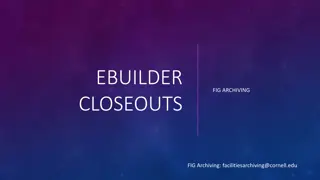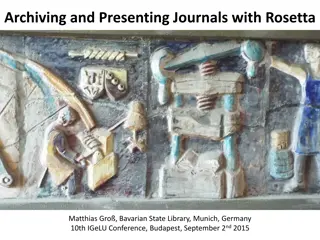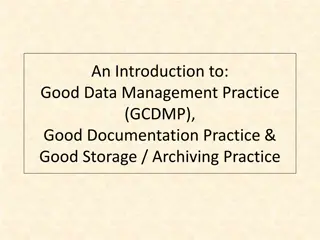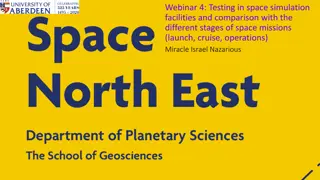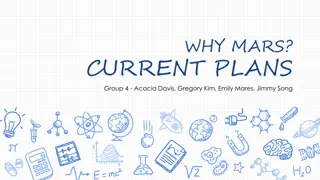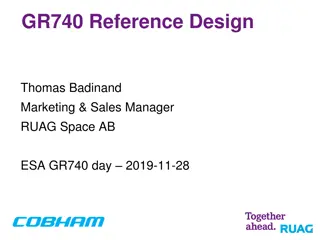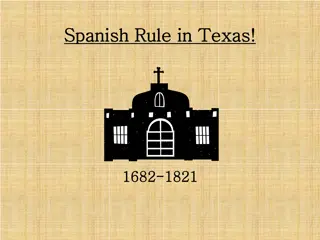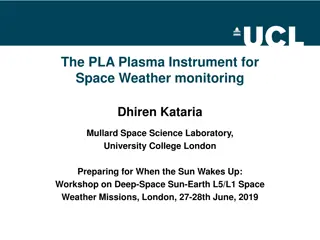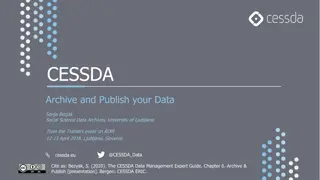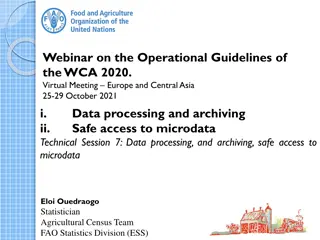Challenges in Data Archiving and Software Requirements for Space Missions
The report highlights various challenges faced in data archiving for space missions, including delays in product delivery, issues with instrument certifications, and ambiguity in software archiving requirements. It also addresses concerns regarding the mandatory nature of support letters for proposals and the confusion among proposers regarding node applications. Recommendations for improving Data Management Plans (DMPs) and clarifications on software archiving requirements are discussed.
Download Presentation

Please find below an Image/Link to download the presentation.
The content on the website is provided AS IS for your information and personal use only. It may not be sold, licensed, or shared on other websites without obtaining consent from the author.If you encounter any issues during the download, it is possible that the publisher has removed the file from their server.
You are allowed to download the files provided on this website for personal or commercial use, subject to the condition that they are used lawfully. All files are the property of their respective owners.
The content on the website is provided AS IS for your information and personal use only. It may not be sold, licensed, or shared on other websites without obtaining consent from the author.
E N D
Presentation Transcript
SBN-UMD short report
. Identify Missions and Instruments where archive products are behind schedule; particularly, those where the identified issues and problems or the willingness of the provider bring any ultimate delivery into question ROSETTA OSIRIS, COSIMA, MIDAS, RPC_ICA, RPC_IES, RPC_LAP, NAVCAM data were not certified during the PDS review, but they are releasing as PSA certified Have not received any data from the lander instruments. BOPPS There was a delay in the lien resolution related to the changes in the PDS schema which have been done since the dataset was reviewed. Now we have everything to finish this dataset, Anne just needs to find time to do the final validation and preparation for archiving.
Briefly, summarize the experience of your node to date with R&A DMPs. Also, your experience to date with PDART proposals. Can you see and recommend any changes to the DMP language, as it exists on the ROSES? In 2015 the SBN/UMD provided support letters for 14 proposals from EW, SSO, SSW, PDART, DDAP and LDAP programs. In 2016, so far comet subnode had 2 Emerging Worlds and 6 SSO requests. We have prepared a list of questions which the proposers need to answer to briefly characterize their data for the letter of support. We have prepared a website ROSES DMP preparation tips http://sbndev.astro.umd.edu/wiki/ROSES_Data_Managment_Plan_Tips#A_description_of_the_schedule_for_data_archiving_and_sharing
Issues: Ambiguity in requirements for the software archiving. This year the letter is not mandatory. This confuses the proposers. I am wondering if the proposers will be treated differently depending on the presence of the letter. Some proposers are confused which node to apply to, especially if they have mixed objects or laboratory data. NASA expects that the source code, with associated documentation sufficient to enable the code s use, will be made publicly available via - GitHub (https://github.com/NASA-Planetary-Science), - the PDS (for mission-specific code, when appropriate), - or an appropriate community-recognized depository (for instance, the homepage of the code base for which a module was developed). Archiving software in a public repository does not require the proposer to maintain the code.
Issues: Ambiguity in requirements for the software archiving. This year the letter is not mandatory. This confuses the proposers. I am wondering if the proposers will be treated differently depending on the presence of the letter. Some proposers are confused which node to apply to, especially if they have mixed objects or laboratory data First page of C.1+Planetary+Overview+Clarified.pdf: "NOTICE: March 2, 2016. The last paragraph of Section 3.5.2 has been clarified to indicate that confirmation from Planetary Data System Discipline Nodes is not mandatory. New text is bold and deleted text is struck through." Proposals must demonstrate an understanding of the work involved in preparing data for the PDS. This can be done through many avenues, including referencing past experience, but those who are new to the PDS are strongly encouraged to obtain and include confirmation from the appropriate Discipline Node that the PDS is willing to accept their submission. It is the proposer s responsibility to conform to PDS standards. [This paragraph was updated March 2, 2016]
Issues: Ambiguity in requirements for the software archiving. This year the letter is not mandatory. This confuses the proposers. I am wondering if the proposers will be treated differently depending on the presence of the letter. Some proposers are confused which node to apply to, especially if they have mixed objects or laboratory data R&A projects with archiving at SBN-UMD awarded in 2014-2016 2014 COMETARY HYDROGEN OBSERVATIONS WITH SOHO SWAN Michael Combi 2015 OBSERVATIONAL CHARACTERIZATION OF ACTIVE MAIN-BELT COMETS AND MAIN-BELT COMET NUCLEI HENRY HSIEH 2015 COMPREHENSIVE ANALYSES OF COMET SIDING SPRING, BEFORE, DURING AND AFTER ITS MARS ENCOUNTER TONY FARNHAM 2015 LABORATORY INVESTIGATIONS OF INTERSTELLAR/PLANETARY/COMETARY ICE ANALOGUES CHRISTOPHER BENNETT
Would you estimate what fraction of an FTE your node spends on DDWG activities? What fraction on CCB? What fraction of time is spent on Tool development? What fraction on Mission archiving? DDWG: 0.25 CCB: 0.10 Tools: 1.25 Mission archiving: 2.50 _______________________ Total 4.10 Not included: non-mission archiving, including R&A proposals support 1.5 PDS4 migration 0.3 hardware maintenance 0.2 website updates 0.25 (wiki) papers and meeting presentations 0.25 etc.
What are your top 3 concerns going forward into the last quarter of the Calendar Year? Lack of funding due to the budget cut. Learn how to deal with Minor Planet Center. PDS4: there are still major roadblocks to operating this system in production. PDS4 issues: 1. Versioning of core and discipline schemas and ambiguity of dependencies between and among dictionaries, and between labels and local dictionaries. 2. Major uncertainties in how the PDS4 system software (registry, search, validation, etc.) will perform in production. No documents, no reports, not clear how it works and what results it produces. 3. There is a steep learning curve involved and it is hard to predict of how this will go or what additional effort might be required (e.g., working with registry). We don't have idle resources, so this could be a blow to schedules.
What % of this years funding have you received? Related to this, if your Resource People can tell you this, how much of your funds have they not yet costed? Received funding: 47% The current deficit is $54.3 K since the additional funding has not been processed to the system. The projection deficit by the end of the year 1 after we receive the remaining year 1 funding >$90K
